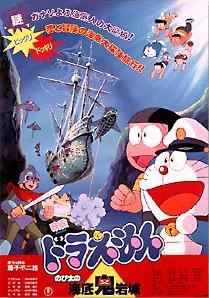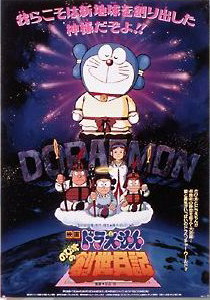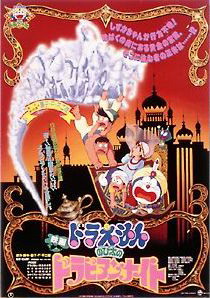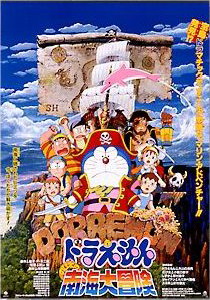 W
WDoraemon: Nobita and the Animal Planet is a feature-length Doraemon film which premiered on March 10, 1990 in Japan, based on the tenth volume of the same name of the Doraemon Long Stories series. It's the 11th Doraemon film.
 W
WDoraemon: Nobita and the Birth of Japan is a feature-length Doraemon film which premiered in Japan on 11 March 1989, based on the ninth volume of the same name of the Doraemon Long Stories series. This was the first Heisei-era Doraemon movie. It's the 10th Doraemon film. In 2016, the movie was remade, with the title of Doraemon: Nobita and the Birth of Japan 2016.
 W
WDoraemon: Nobita and the Castle of the Undersea Devil is the fourth Doraemon film, released on March 12, 1983, in Japan. Directed by Tsutomu Shibayama, the film is based on the Western myth of Atlantis, the lost city.
 W
WDoraemon: Nobita and the Galaxy Super-Express , also known as Doraemon and the Galaxy Express, is a feature-length Doraemon film which premiered in Japan on March 2, 1996, based on the 16th volume of the same name of the Doraemon Long Stories series. The film is a homage of Leiji Matsumoto's Galaxy Express 999. It's the 17th Doraemon film. The film was directed by Tsutomu Shibayama.
 W
WDoraemon: Nobita and the Kingdom of Clouds , also known as Doraemon and the Kingdom of Clouds, is a feature-length Doraemon film which premiered on March 7, 1992, in Japan, based on the 12th volume of the same name of the Doraemon Long Stories series. It's the 13th Doraemon film.
 W
WDoraemon: Nobita and the Knights on Dinosaurs is the eighth feature-length Doraemon film which premiered on March 14, 1987 in Japan, based on the eighth volume of the same name of the Doraemon Long Stories series. It was the highest-grossing animated film of the year 1987.
 W
WDoraemon: Nobita and the Legend of the Sun King , also known as Doraemon and the Empire of the Sun, is a feature-length Doraemon film which premiered on March 4, 2000, in Japan, based on the 20th volume of the same name of the Doraemon Long Stories series. It's story is an alteration of the story The Prince and the Pauper by Mark Twain and Snow White by the Brothers Grimm as the two main characters switch places. It was premiered together with the Doraemon short film Doki Doki Wildcat Engine and Doraemon: A Grandmother's Recollections. It was a successful film at the box office, grossing around ¥3.42 billion ($32 million), becoming the highest grossing Doraemon film of the original series. It's the 21st Doraemon film. The film celebrates 30 years of the Doraemon franchise. This is the last old millennium and old century era Doraemon movie, released ten months before the early new millennium, new century, and new year era begins.
 W
WDoraemon: Nobita and the Spiral City , also known as Doraemon and the Spiral City, is a feature-length Doraemon film which premiered in Japan on 8 March 1997, based on the 17th volume of the same name of the Doraemon Long Stories series. It was the last Doraemon film to be supervised by Hiroshi Fujimoto, due to his death. It's the 18th Doraemon film. In India, it was released on July 26, 2020.
 W
WDoraemon: Nobita and the Steel Troops is a 1986 anime science fiction film based on the seventh volume of the same name of the Doraemon Long Stories series. The original plot was written by Fujiko F. Fujio. Alternate titles include The Platoon of Iron Men, or The Robot Army. The film pays homage to many anime series featuring giant robots or "mecha", most notably Gundam and Mazinger. It's the 7th Doraemon film.
 W
WDoraemon: Nobita and the Tin Labyrinth is a feature-length Doraemon film which premiered on 6 March 1993 in Japan, based on the 13th volume of the same name of the Doraemon Long Stories series. It is the 14th Doraemon film.
 W
WDoraemon: Nobita and the Windmasters , also known as Doraemon and the Wind People, is a feature-length Doraemon film which premiered on March 8, 2003 in Japan, based on the 23rd volume of the same name of the Doraemon Long Stories series. It's the 24th Doraemon film.
 W
WNobita and the Winged Braves , also known as Doraemon and the Winged Warriors, is a feature-length Doraemon film which premiered in Japan on 10 March 2001, based on the 21st volume of the same name of the Doraemon Long Stories series. It's the 22nd Doraemon film. This is the first new millennium and new century-era Doraemon movie.
 W
WDoraemon: Nobita Drifts in the Universe is the second Doraemon film released after Hiroshi Fujimoto's departure, based on the 19 volume of the same name of the Doraemon Long Stories series. This is the third movie solely produced by Fujiko Production following The Record of Nobita's Parallel Visit to the West (1988) and Nobita's Great Adventure in the South Seas (1998). This movie commemorates the 20th anniversary of the Doraemon film series. It was released on March 6, 1999, together with Doraemon: Nobita's the Night Before a Wedding and Funny Candy of Okashinana!?. It is the 20th Doraemon film.
 W
WDoraemon: Nobita in the Robot Kingdom also known as Doraemon the Movie 2002 is a feature-length Doraemon film which premiered in Japan on March 9, 2002, based on the 22nd volume of the same name of the Doraemon Long Stories series. It's the 23rd Doraemon film.
 W
WDoraemon: Nobita in the Wan-Nyan Spacetime Odyssey is a Japanese anime feature film, based on the 24th and final volume of the same name of the Doraemon Long Stories series. Directed by Tsutomu Shibayama, the film premiered in Japan on March 7, 2004. It is the 25th Doraemon feature film and the last film of the original Doraemon film series.
 W
WDoraemon: Nobita's Diary on the Creation of the World is a feature-length Doraemon film which premiered on March 4, 1995, in Japan, based on the 15th volume of the same name of the Doraemon Long Stories series. It is the 16th Doraemon film.
 W
WDoraemon: Nobita's Dorabian Nights , also known as Doraemon Nights, is a feature-length Doraemon film which premiered on 9 March 1991 in Japan, based on the 11th volume of the same name of the Doraemon Long Stories series. It's the 12th Doraemon film.
 W
WDoraemon: Nobita's Great Adventure in the South Seas is a science fiction adventure film which premiered on March 7, 1998 in Japan, based on the 18th volume of the same name of the Doraemon Long Stories series. It won Best Animation Film at the 1998 Mainichi Film Awards and was also nominated for best animation film in the Japanese Media Arts Festival. In late 2014, Disney XD in Southeast Asia produced and aired an English dub version of this movie. It is the first Doraemon movie after the death of Fujiko F. Fujio. It's the 19th Doraemon film.
 W
WDoraemon: Nobita's Great Adventure into the Underworld , also known as Doraemon, Nobita and the Underworld Adventure, is a feature-length Doraemon film which premiered on March 17, 1984, in Japan, based on the fifth volume of the same name of the Doraemon Long Stories series. The fifth in series, it was the first to incorporate computer graphics technology. The film was watched by more than 3 million people and generated a revenue of 1.65 billion yen. It became the highest grossing animated film of 1984. By its release, Doraemon became the first and the only franchise to have 2 back-to-back highest-grossing animated films of the year. A remake of this film was released in Japan on March 10, 2007, entitled Doraemon: Nobita's New Great Adventure into the Underworld. It is the 5th Doraemon film.
 W
WDoraemon: Nobita's Little Star Wars is a feature-length Doraemon film which premiered in Japan on March 16, 1985. As the film's title suggests, it is a parody of George Lucas' original Star Wars trilogy, with a few elements from his 1983 film Return of the Jedi. The film is directed by Tsutomu Shibayama. The theme song of this film is performed by Tetsuya Takeda. It's the 6th Doraemon film. The remake of the film, Doraemon: Nobita's Little Star Wars 2021 will be released on 4 March 2022 after being postponed from its original 5 March 2021 release date due to the COVID-19 pandemic.
 W
WDoraemon: The Record of Nobita's Parallel Visit to the West , also known as Doraemon's Parallel Journey to the West, is a feature-length Doraemon film which premiered on March 12, 1988 in Japan. It is loosely based on the 16th-century novel Journey to the West. It is the 9th Doraemon film and last Showa-era Doraemon.
 W
WDoraemon: Nobita's Three Visionary Swordsmen is a feature-length Japanese animated film which premiered in Japan on March 12, 1994, based on the 14th volume of the same name of the Doraemon Long Stories series. This film marks the 15th anniversary of the Doraemon television series on TV Asahi. It's the 15th Doraemon film.
 W
WGanbare!! Tabuchi-kun!! , is a yonkoma manga series by Hisaichi Ishii which ran in the weekly Manga Action magazine from 1978 to 1979 in Japan. After that series ended, Ishii continued creating more baseball gag comics which were then collected under the title Tabuchi-kun (タブチくん) and released from 1985 to 1989.
 W
WMakoto-chan (まことちゃん) is a shōnen gag manga by Kazuo Umezu. The series was initially published in Weekly Shōnen Sunday from April 18, 1976, to July 8, 1981, and later returned from August 24, 1988, to July 26, 1989, as "Heisei-ban Makoto-chan".